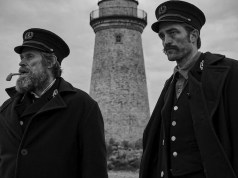Richard Linklater lost some street cred with “School of Rock,” which violated true independent-film principles by being a box office success, and “Bad News Bears,” which broke the rules by being a crappy remake. But the maverick director is back to his experimental roots with “A Scanner Darkly,” a futuristic sci-fi story told, as was his 2001 film “Waking Life,” through the magic of rotoscoping.
You may not know the word, but you’ve seen the process. It’s when the images in a regular live-action film are traced over by animation artists, frame by frame, giving the movie a real-but-animated look. (Those of us of a certain age recall with fondness A-ha’s “Take on Me” music video, which used rotoscoping extensively.) “Waking Life” was rotoscoped to enhance the movie’s feeling of surreal dreaminess; “A Scanner Darkly” seems to be doing it just for the sake of doing it. If it weren’t quasi-animated, there would be almost nothing about the film worth noting.
Based on a novel by Philip K. Dick — whose works have inspired films both good (“Minority Report,” “Total Recall”) and bad (“Impostor,” “Paycheck”) — “Scanner” is set a few years in the future, in a heavily surveilled America where 20 percent of the citizens are addicted to a new illicit drug called Substance D. An organization called New Path is providing rehab for recovering D addicts, but their methods are mysterious and their treatment centers are not open to public scrutiny.
Officer Fred (Keanu Reeves) is a cop working deep undercover to expose a drug ring — so deep even his co-workers don’t know his true identity. (A costume called a scramble suit obscures the physical traits and voice of the wearer.) He shares a house with some paranoid burnout drug addicts, including Robert Downey Jr and Woody Harrelson. (Well, OK, characters PLAYED by Robert Downey Jr. and Woody Harrelson.) One of them rats out someone named Robert Arctor as a drug dealer, unaware (as are the cops) that Robert Arctor is — ta-da! — Officer Fred.
Soon Officer Fred is being instructed to plant bugs in Robert Arctor’s (i.e., his own) house and to secretly monitor all activities in the home, all in the interest of ferreting out the dealers and addicts. You can imagine what such an assignment does to the already rather schizophrenic Officer Fred, who’s been taking Substance D himself to aid in infiltrating the drug ring.
A pretty decent premise, you’ll agree, but the story doesn’t give it the respect it deserves. Instead, it’s used as a stepping-stone to a larger, more complicated treatise on the government’s abuse of power (one of Dick’s favorite themes). Which is all well and good, except “A Scanner Darkly,” for all its intriguing visual elements, turns out to be a rather mundane story, not particularly surprising or twisty or inventive.
Acting-wise, it’s like a greatest hits collection: Harrison and Downey play crazy people, and Reeves exudes his usual dull confusion. Winona Ryder is in there, too, as a friend of Robert Arctor’s.
I think some people will be tricked by the unusual visual style into thinking the film is more interesting than it is. I say look beyond that at what’s actually happening and you’ll realize that without the rotoscoping, the movie would be completely undistinguished, competent but only mildly entertaining.
C (1 hr., 40 min.; )





